|
|
|
Sort Order |
|
|
|
Items / Page
|
|
|
|
|
|
|
| Srl | Item |
| 1 |
ID:
110834
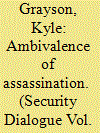

|
|
|
|
|
| Publication |
2012.
|
| Summary/Abstract |
This article begins by presenting a biopolitical account of assassination and targeted killing events carried out by liberal regimes. It argues that forms of political violence are understood and made meaningful beyond the administrative frameworks and technical rationalizations often privileged in biopolitical analyses. Deploying Alan Feldman's (1991) argument that political violence is an 'emplotted action' alongside William Connolly's (2005) notion of resonance, it provides a genealogical account of how forms of assassination have been positioned within Western cultural understandings of political violence. The focal point of examination is the biblical heroine Judith, whose story has resonated as a preferred narrative structure for understanding and (de)legitimating acts of assassination among Western publics. Through its reading of the book of Judith, the article highlights the importance of ambivalence for understanding assassination as a form of political violence. The legacy of the moral problematique enabled by Judith is then illustrated in relation to US President Barak Obama's May 2011 speech announcing the killing of Osama Bin Laden. The article concludes by suggesting that although the story of Judith may underpin contemporary assassination practices, it also offers a means of critically engaging with them.
|
|
|
|
|
|
|
|
|
|
|
|
|
|
|
|
| 2 |
ID:
120328
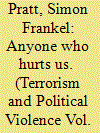

|
|
|
|
|
| Publication |
2013.
|
| Summary/Abstract |
This article examines the evolving logic to the systematic assassinations of Palestinian activists carried out by Israel during the Aqsa Intifada (September 2000-2005). It argues that the logic of Israel's "assassination policy" developed in three stages. During each successive stage, the security executive expanded the scope of who could be legitimately targeted and what goals could be served in doing so. This article further argues that normative and legal considerations played a key role in determining target selection and tactical means. It finds that during the Aqsa Intifada, the Israeli government used assassination not according to any unified purpose but rather as an evolving and often ad hoc combination of political communication, tactical action and, more rarely, strategic manipulation. In short: there was not one single rationale driving the assassinations but several.
|
|
|
|
|
|
|
|
|
|
|
|
|
|
|
|
| 3 |
ID:
139094


|
|
|
|
|
| Summary/Abstract |
This article examines the term ‘assassination’ as describing a certain kind of killing which may – and does – occur in warfare. It critiques current definitions of the term to synthesise a stronger and more value-neutral definition: the premeditated killing of a specific individual in order to realise political objectives. It also critiques the term ‘targeted killing’ for a comparative lack of analytical clarity. The article then presents a theory of the goals assassination may achieve and the effects it may have on a conflict environment, when occurring within a military context. The article reviews three case studies which illustrate the scope of the theory, and concludes by noting that assassination can be the subject of legitimate ethical debate, as it may potentially adhere to the norms of Just War Theory, while constituting a valid category of military action.
|
|
|
|
|
|
|
|
|
|
|
|
|
|
|
|
| 4 |
ID:
148069
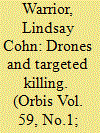

|
|
|
|
|
| Summary/Abstract |
There is widespread interest in how armed drones are used, how targets are chosen, and what frameworks of legality and political accountability exist. Less addressed is how use, targeting, justification, and accountability affect the people and the organizations being asked to operate the drones. This article examines the costs to the operators and the military organization of increased reliance on drones. It argues that the government and the public need to come to terms with the human costs—both foreign and American—of increased use of unmanned systems. It concludes that the government needs to find a way to make its employment of drones transparent and accountable enough that it will not harm the overall well-being, morale, and loyalty of the force.
|
|
|
|
|
|
|
|
|
|
|
|
|
|
|
|
| 5 |
ID:
153888


|
|
|
|
|
| Summary/Abstract |
This article examines the potential use of autonomous aerial weapons for targeted killing purposes and, in doing so, looks beyond the now-familiar “global war on terror.” We argue that the combination of novel capabilities with the pre-existing military-theoretical frameworks of advanced Western states, within which autonomous weapons will be embedded, may be conducive to an expansion of targeted killings to scenarios other than military counter-terrorism. The confluence of autonomous weapons and targeted killing practices may therefore lead to a further weakening of long-standing norms regulating the use of force, including in interstate scenarios. We also find that international regulation is unlikely to forestall this outcome, and that political-military insistence on centralized operational control may mitigate—but not negate—the disruptive potential of these developments. As a result, the possible consequences for the international order of an evolution of targeted killing practices along these lines should not be underestimated.
|
|
|
|
|
|
|
|
|
|
|
|
|
|
|
|
| 6 |
ID:
081457


|
|
|
|
|
| Publication |
2008.
|
| Summary/Abstract |
This article analyses legal aspects of the `war on terror'. It argues that, by making recourse to a semantic of risk, danger and, in particular, precaution, the `war on terror' blurs crucial political and legal categories of public and private, of peace and war, of combatants and civilians, thus redefining the relationship between political responsibility, time and security. As a consequence, the extrajudicial killing of individuals becomes a form of risk management that takes place beyond established mechanisms of accountability.
|
|
|
|
|
|
|
|
|
|
|
|
|
|
|
|
| 7 |
ID:
153887
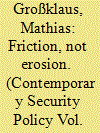

|
|
|
|
|
| Summary/Abstract |
Reframed as “targeted killing,” state-sponsored assassination is moving toward normalization. I maintain that this development can only be understood in the context of long-standing frictions between meta-norms. The regulation of assassination as an instrument of foreign policy is a normative amalgam that is connected to both state sovereignty and liberal thought. Those discursive links structure both the evolution of the norm and its transformation, as they can be invoked by actors in order to reinterpret and reshape it. As I argue, the prevalent “norm erosion” perspective fails to grasp such incremental processes in that it tends to limit its analytical view to single, narrowly defined norms and overemphasizes external shocks. I thus stress the need for a more comprehensive account of normative change that highlights the surrounding meta-norms that are able to connect single norms to their larger position within the international order.
|
|
|
|
|
|
|
|
|
|
|
|
|
|
|
|
| 8 |
ID:
139504
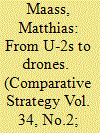

|
|
|
|
|
| Summary/Abstract |
Since September 11, 2001, the United States has been relying heavily on drone strikes for counterterrorism. This policy remains controversial. I argue that assertive statecraft is needed to prevent drone strikes from undermining U.S. foreign and security policy over the long term. The article argues legally, comparatively, and historically, using President's Eisenhower restrictions on U.S. aerial espionage programs during the earlier Cold War, as a benchmark for President Obama's policy on missions by armed drones. A more limited drone program offers a better balance between what is necessary for security and what is politically sustainable.
|
|
|
|
|
|
|
|
|
|
|
|
|
|
|
|
| 9 |
ID:
157723
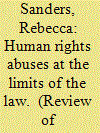

|
|
|
|
|
| Summary/Abstract |
Law following and law breaking are often conceptualised as polar opposites. However, authorities in liberal democracies increasingly deploy a strategy of what I call plausible legality in order to secure immunity and legitimacy for proscribed practices. Rather than ignore or suspend law, they construct legal justifications for human rights abuses and other dubious policies, obscuring the distinction between legal compliance and non-compliance. I argue this is possible because instabilities in legal rules make them vulnerable to manipulation and exploitation. By tracing American rationales for contentious ‘enhanced interrogation techniques’, indefinite detention, and ‘targeted killing’ practices in the ‘Global War on Terror’, I show that law need not always be abandoned or radically reconstituted to achieve troubling ends and that rule structures enable certain patterns of violation while limiting others. The international prohibition on torture is robust and universal, but provides vague definitions open to interpretation. Detention and lethal targeting regulations are jurisdictionally layered and contextually complex, creating loopholes and gaps. The article concludes by reflecting on implications for the protection of human rights. While law is not wholly indeterminate, human rights advocates must constantly advocate shared legal understandings that constrain state violence.
|
|
|
|
|
|
|
|
|
|
|
|
|
|
|
|
| 10 |
ID:
147553
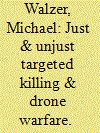

|
|
|
|
|
| Summary/Abstract |
Targeted killing in the “war on terror” and in war generally is subject to familiar and severe moral constraints. The constraints hold across the board; they don't change when drones are the weapon of choice. But the ease with which drones can be used, the relative absence of military risks and political costs, makes it especially tempting not only to use drones more and more, but also to relax the constraining rules under which they are used. It seems clear that the rules have, in fact, been relaxed in the course of the American experience with drone warfare – by presidential decision and without public debate. This essay is an argument for the opening up of the decision process to democratic scrutiny and in defense of the familiar constraints.
|
|
|
|
|
|
|
|
|
|
|
|
|
|
|
|
| 11 |
ID:
156905


|
|
|
|
|
| Summary/Abstract |
Targeted killings have become a central component of counterterrorism strategy. In response to the unprecedented prevalence of this strategy around the world, numerous empirical studies have recently examined whether “decapitating” militant groups with targeted killings is strategically effective. This study builds on that research program by examining the impact of targeted killings on militant group tactical decision-making. Our empirical strategy exploits variation in the attack patterns of militant groups conditional on whether a government’s targeted killing attempt succeeded against them operationally. In both the Afghanistan-Pakistan and Israel-West Bank-Gaza Strip theaters, targeted killings significantly alter the nature of militant group violence. When their leaderships are degraded with a successful strike, militant groups become far less discriminate in their target selection by redirecting their violence from military to civilian targets. We then analyze several potential causal mechanisms to account for these results and find strongest evidence that targeted killings tend to promote indiscriminate organizational violence by empowering lower level members with weaker civilian restraint.
|
|
|
|
|
|
|
|
|
|
|
|
|
|
|
|
| 12 |
ID:
168412
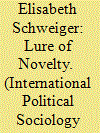

|
|
|
|
|
| Summary/Abstract |
The concept “targeted killing” has been increasingly adopted in scholarship, policy, and media discourses, particularly in the context of US armed drone attacks. While “targeted killing” is often understood as something new, there are strong historical continuities with more traditional concepts such as “assassination” and “extra-judicial execution,” as well as with the colonial concept “police bombing.” This paper builds on an analysis of over nine hundred Security Council debates, Human Rights Council reports, legal papers, and policy documents. Tracing the conceptual continuities, I argue that the peculiar novelty of “targeted killing” does not mainly stem from the novelty of the practices and claims it describes but from the contradictory modes in which the term has been used, which has problematic repercussions for recent counterterrorism discourses. Posed as a new category that reacts to a new situation, the adoption of the concept “targeted killing” has, I argue, played an important role in the promotion of claims that were long considered unlawful and illegitimate. Demonstrating the importance of language in setting political struggles up in a particular way, the paper contributes to a growing body of critical work on counterterrorism use of force.
|
|
|
|
|
|
|
|
|
|
|
|
|
|
|
|
| 13 |
ID:
165315
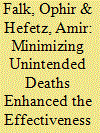

|
|
|
|
|
| Summary/Abstract |
Targeted killing has become a primary counterterrorism measure used by a number of countries in their confrontation with lethal threats. This article focuses on the impact of unintended deaths on the effectiveness of targeted killing. The article evaluates the effectiveness of targeted killings carried out in the Israeli–Palestinian conflict theater that resulted in unintended deaths, compared to the effectiveness of targeted killings where the intended target is the sole person killed. Using multivariate analysis, we demonstrate that targeted killings with unintended deaths were followed by a greater number of suicide bombings and associated casualties compared with targeted killings with no unintended deaths. Based on these findings, nations involved in such conflicts should strive to inflict as few unintended deaths as possible, not only because it is morally right, but also because it is more effective in mitigating terrorism.
|
|
|
|
|
|
|
|
|
|
|
|
|
|
|
|
| 14 |
ID:
186519
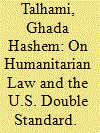

|
|
|
|
|
| Summary/Abstract |
U.S. criticism of its client/ally Saudi Arabia regarding the killing of journalist Jamal Khashoggi immediately diminished the kingdom’s ability to secure funds for its latest mega development project, the Neom convention center. U.S. intelligence pinned the crime on aides to Crown Prince Muhammad Bin Salman (MBS). At the same time, a seemingly unauthorized operation, later attributed to former president Donald Trump, killed a top Iranian commander, Qasem Suleimani, by a drone strike. Congress was not involved and the UN protested this as a violation of Article 51 of its Charter, emphasizing that this was justified in a case of imminent threat, undertaken only by a state. Encouraged by drone technology, the U.S. found it easy to locate the target and minimize collateral damage. International lawyers and military experts are still debating the legitimacy of such action. The U.S. is persisting in claiming that it upholds the standards of international humanitarian law which sometimes sanctions targeted killing. A number of international law professors continue to deride U.S. action as illegal, while the latter continues to describe its actions as defensive in nature. Organizations such as Human Rights Watch lament the reluctance of previous U.S. presidents to define targeted killing.
|
|
|
|
|
|
|
|
|
|
|
|
|
|
|
|
| 15 |
ID:
132175
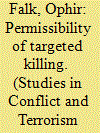

|
|
|
|
|
| Publication |
2014.
|
| Summary/Abstract |
Targeted killing has become an increasingly prevalent tactic employed by states in their efforts to counter terrorism. Despite its widespread use, the criteria for targeted killing permissibility have remained vague. This article identifies and evaluates the circumstances under which targeted killings can be considered permissible and looks at on-the-ground implementation by Israel and the United States. While both Israel and the United States may have largely adhered to the laws of armed conflict, in practice, discrepancies in implementation exist. This is primarily due to the ambiguity of the "distinction" and "proportionality" principles, two key legal and moral criteria that need further clarification.
|
|
|
|
|
|
|
|
|
|
|
|
|
|
|
|
| 16 |
ID:
153889
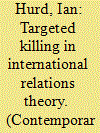

|
|
|
|
|
| Summary/Abstract |
As new technologies make possible new modes of war, they cause tension in the previously prevailing conceptual categories. This is evident, as the practice of targeted killing by governments has increased in frequency and prominence, largely due to the American use of armed drones around the world. The essays in this special issue explore how norms, rules, and laws that many people thought were settled have been roiled by new technologies of targeted killing. This includes rules on sovereignty, territory, due process, and the distinction between civilian and combatant. The essays sketch an implicit research program around the recursive relation between rules and practice. I draw these out into a more general model for scholarship at the boundaries between law and politics and between concepts and practices.
|
|
|
|
|
|
|
|
|
|
|
|
|
|
|
|
| 17 |
ID:
122029
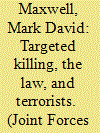

|
|
|
| 18 |
ID:
153884
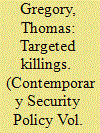

|
|
|
|
|
| Summary/Abstract |
The use of drones to kill suspected militants seems to provide a simple technical fix to a complex ethico-political problem: the need to discriminate between combatants and noncombatants. The technological ability of drones, combined with the rhetorical commitment to reducing civilian casualties, suggests that the principle of noncombatant immunity is firmly entrenched in debates about targeted killings. However, this article will argue that a peculiar effect of this enhanced technological capability has been to draw attention to the conceptual confusion that surrounds the distinction. Rather than assuming that it is a fixed feature of international law, I will argue that it should be viewed as a discursive formation that is contingent upon a precarious process of repetition and reiteration. Moreover, I will show how the laws designed to restrain the violence inflicted on civilian bodies have been invoked to render certain civilians vulnerable, constituting them as killable, their lives profoundly losable.
|
|
|
|
|
|
|
|
|
|
|
|
|
|
|
|
| 19 |
ID:
153876
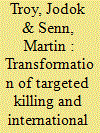

|
|
|
|
|
| Summary/Abstract |
This article introduces the special issue’s question of whether and how the current transformation of targeted killing is transforming the global international order and provides the conceptual ground for the individual contributions to the special issue. It develops a two-dimensional concept of political order and introduces a theoretical framework that conceives the maintenance and transformation of international order as a dynamic interplay between its behavioral dimension in the form of violence and discursive processes and its institutional dimension in the form of ideas, norms, and rules. The article also conceptualizes targeted killing and introduces a typology of targeted-killing acts on the basis of their legal and moral legitimacy. Building on this conceptual groundwork, the article takes stock of the current transformation of targeted killing and summarizes the individual contributions to this special issue.
|
|
|
|
|
|
|
|
|
|
|
|
|
|
|
|
|
|
|
|
|